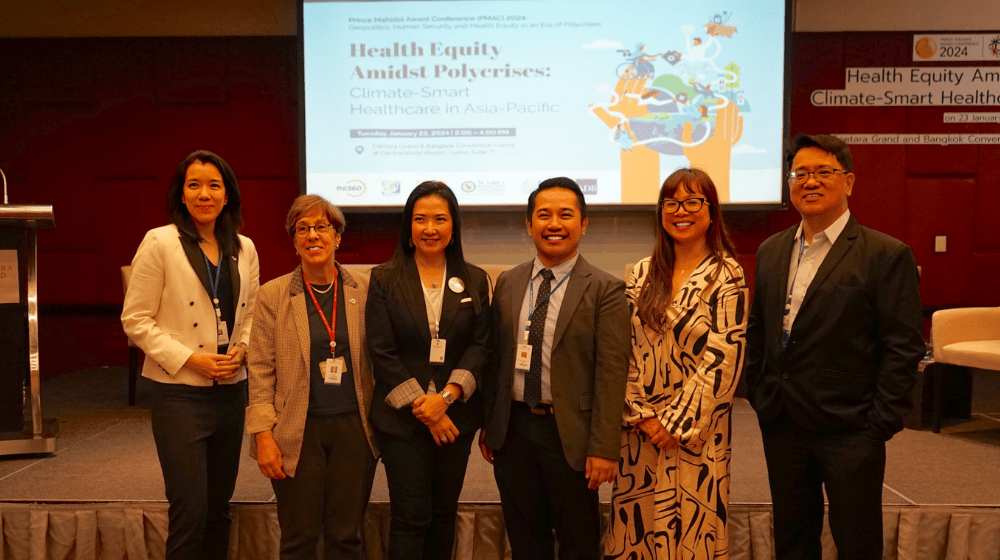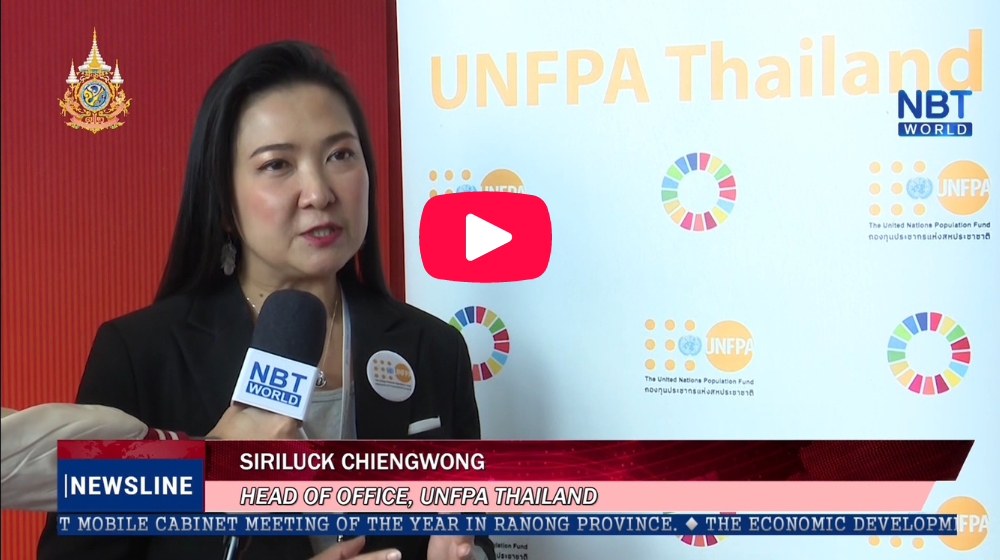
Bangkok, Thailand, January 23, 2024 – FHI 360 alongside UNFPA Thailand, the Asian Development Bank (ADB), Health Care Without Harm Southeast Asia, St. Luke’s Medical Center College of Medicine, and Health Systems Global convened a side event – Health Equity Amidst Polycrises: Climate-Smart Healthcare in Asia-Pacific – at the Prince Mahidol Award Conference (PMAC) 2024. Participants comprised of policymakers, healthcare professionals, researchers, and representatives from civil society, international organizations and the private sector explored evidence-based, practical solutions for addressing the detrimental consequences of climate change on public health, with a particular focus on the unique geopolitical dynamics, historical inequities and diverse health system capacities within the Asia-Pacific region.
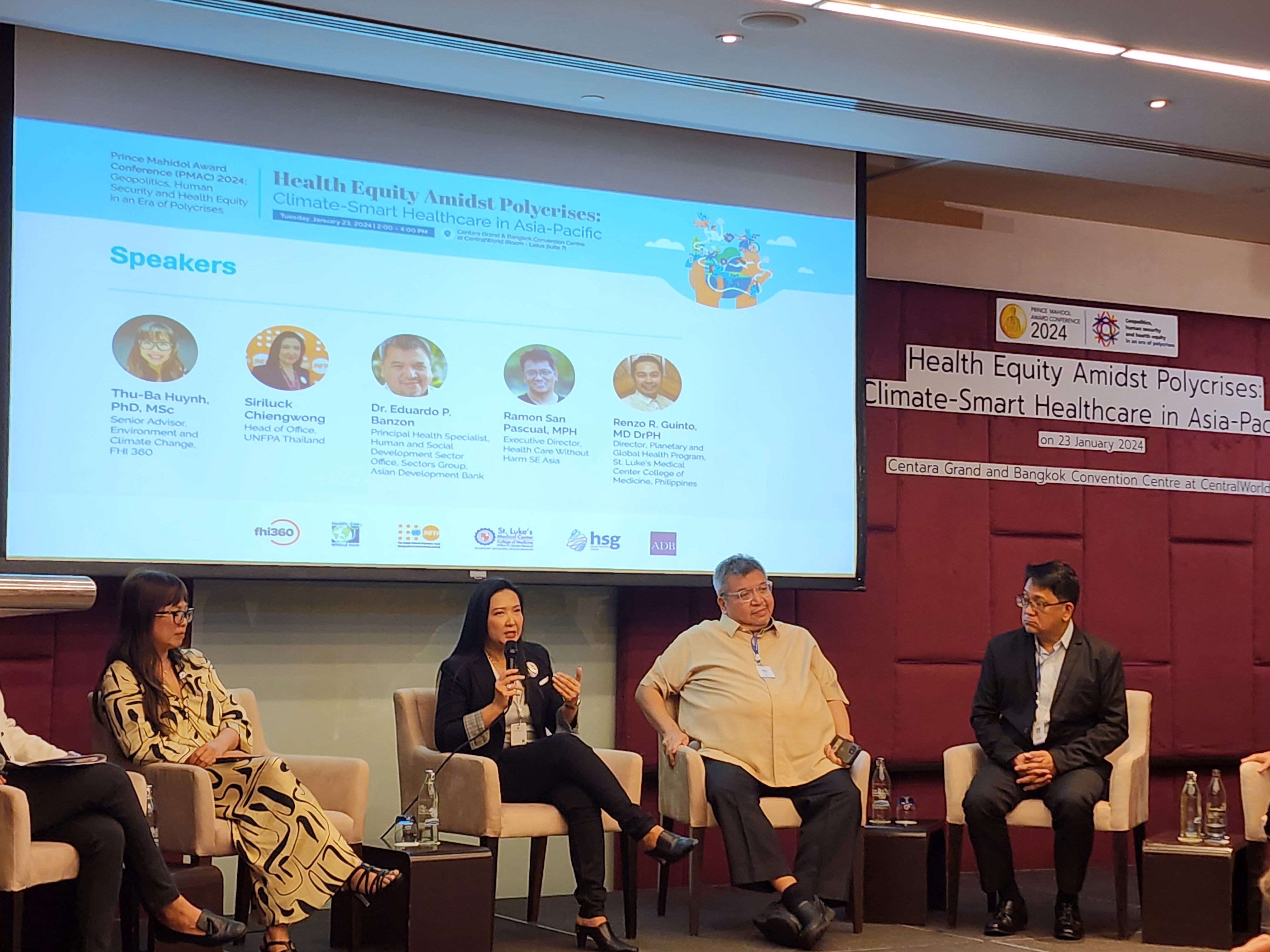
Thu-Ba Huynh, PhD, MSc, Senior Advisor for Environment and Climate Change at FHI 360, emphasized, “By recognizing and defining polycrises, we pave the way for a holistic understanding of the challenges, allowing us to implement strategies that address the root causes and build a more resilient healthcare systems.”
Siriluck Chiengwong, Head of Office, UNFPA Thailand, highlighted the need for a concerted effort in addressing the dynamic intersection of human well-being and climate change. She stated, “UNFPA works not only to protect vulnerable groups of population, especially women and girls, but also to ensure their active participation in decision-making processes for more inclusive climate-related policies. ”
Ramon San Pascual, MPH, Executive Director, Health Care Without Harm Southeast Asia, stressed the importance of a shift in mindset and practices in healthcare sustainability. He mentioned, “We need innovative approaches and cross-sectoral collaboration to drive lasting change in the health sector.”
Dr. Eduardo P. Banzon, Principal Health Specialist, Human and Social Development Sector Office, Sectors Group, Asian Development Bank, shared insights on overcoming financial challenges. He emphasized, “Financial challenges should not hinder climate action. This event explored how strategic investments and forward-looking initiatives by institutions like ADB can contribute to building resilience and combating the challenges posed by climate change in the Asia-Pacific region.”
Renzo R. Guinto, MD DrPH, Director, Planetary and Global Health Program, St. Luke’s Medical Center College of Medicine, Philippines, and Chair, Thematic Working on Climate-Resilient and Sustainable Health Systems, Health Systems Global, underlined the broader responsibility of academic and research institutions. He stated, “This new era of polycrises, which includes the existential threat of climate change, calls for greater transdisciplinary collaboration. Those of us working in health policy and systems must now work together with those in environmental science, climate policy, among others.” He also emphasized the vital role academia can play in catalyzing change by generating evidence and offering new ways of thinking in order to build climate-resilient health systems.
This collaborative effort at PMAC 2024 underscores the importance of multi-disciplinary stakeholders’ commitment to collectively addressing the complex interplay between climate change and public health in the Asia-Pacific region, paving the way for more resilient and sustainable health and climate outcomes.
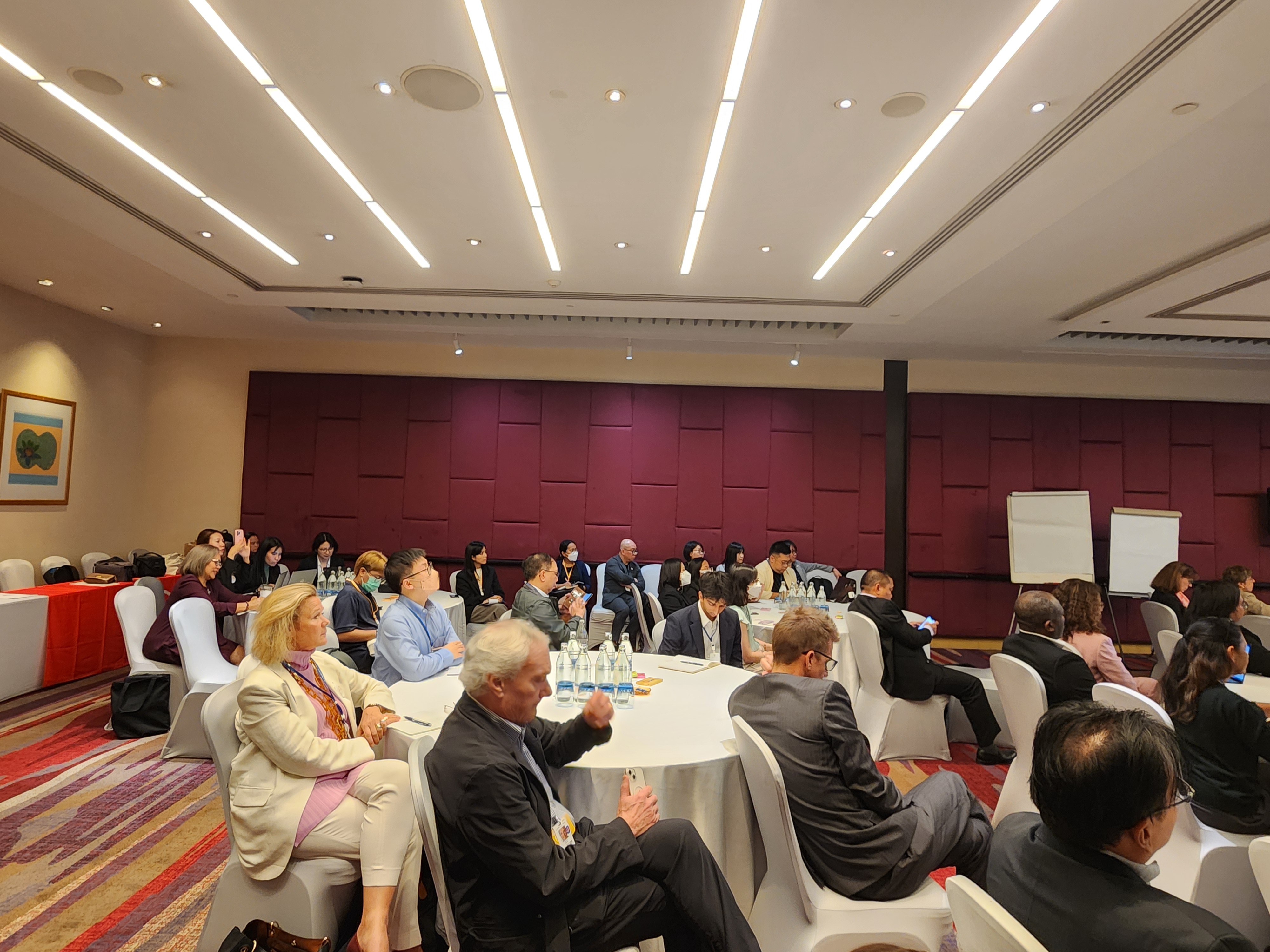
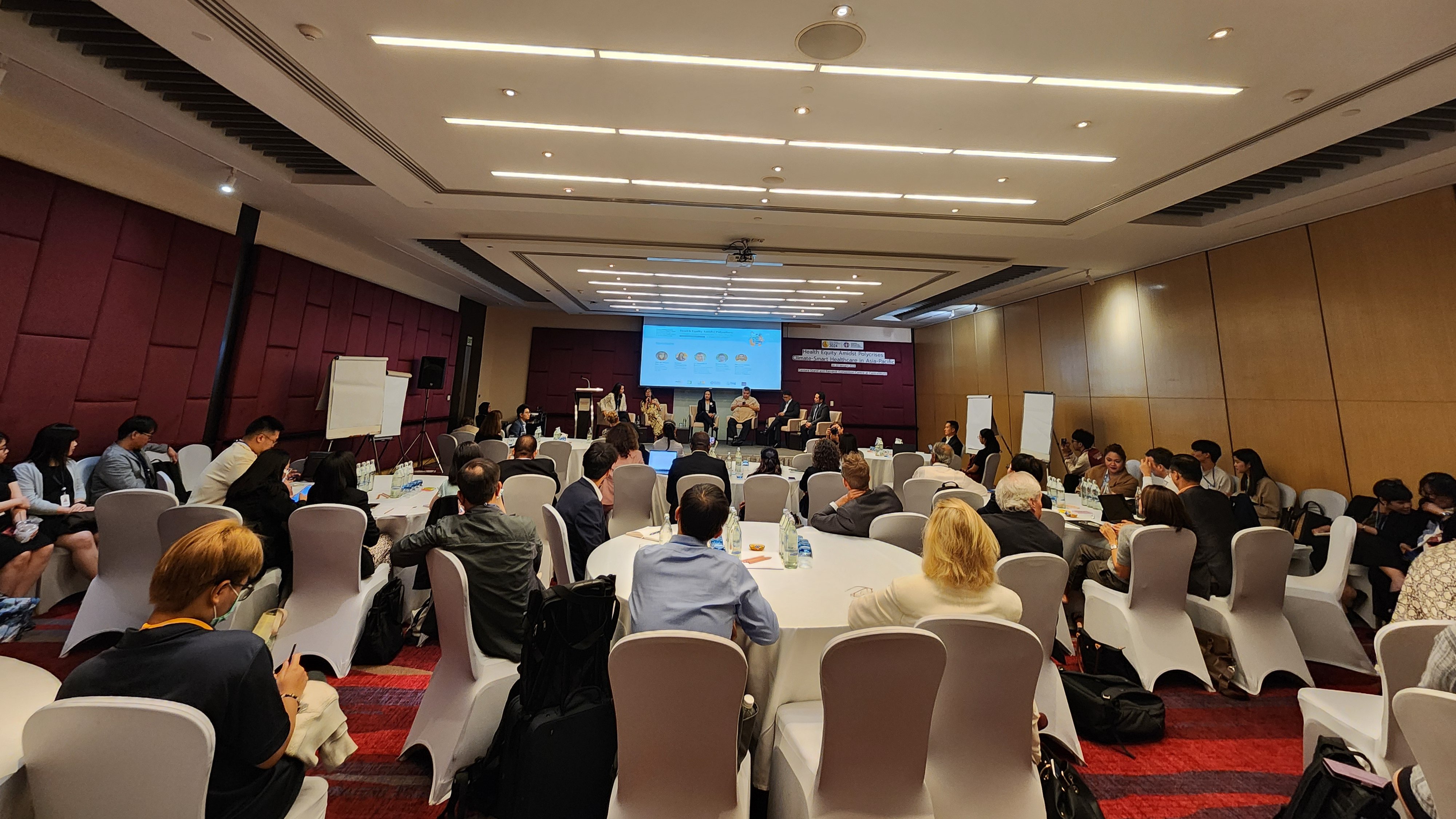
By NBT World, Link to news.
For media inquiries, please contact
- Allison Bozniak, associate director of public engagement at FHI 360, at abozniak@fhi360.org
- Kulwadee Sumalnop, Communication Specialist at UNFPA Thailand, at sumalnop@unfpa.org
|
About UNFPA Thailand UNFPA is the United Nations sexual and reproductive health agency. Contributing to the Sustainable Development Goals achievement of Thailand under the United Nations Country Team (UNCT) in Thailand, UNFPA’s support to the country is in line with the United Nations Sustainable Development Cooperation Framework (UNSDCF) 2022-2026, and the 13th National Economic and Social Development Plan (2023-2027) of Thailand and international normative standards, including the Convention on the Elimination of All Forms of Discrimination against Women and the International Conference on Population and Development (ICPD).
Through ‘Life-cycle approach to aging’ and the utilization of evidence on population changes and megatrends, including population ageing and climate change, for the development and monitoring of population policies and programmes, UNFPA focuses on “leaving no one behind”, and aims to achieve three transformative results as follows:
For the full UNFPA Thailand’s Country Programme Document, please visit here, or the factsheet of UNFPA Thailand, here. |
|
About FHI 360 FHI 360 mobilizes research, resources and relationships so people everywhere have access to the opportunities they need to lead full and healthy lives. With collaborations in more than 60 countries, we work directly with local leaders to advance social and economic equity, improve health and well-being, respond to humanitarian crises, and strengthen community resilience. We share data-driven insights and scalable tools that expand access and equity so communities can effectively address complex challenges, respond to shocks and achieve thriving futures.
To learn more, visit fhi360.org. |
|
About ADB The Asian Development Bank (ADB) is a regional development bank established on 19 December 1966, which is headquartered in the Philippines. The bank also maintains 31 field offices around the world to promote social and economic development in Asia. Starting with 31 members at its establishment, ADB now has 68 members. ADB is committed to achieving a prosperous, inclusive, resilient, and sustainable Asia and the Pacific, while sustaining its efforts to eradicate extreme poverty. ADB assists its members, and partners, by providing loans, technical assistance, grants, and equity investments to promote social and economic development. In alignment with declaration from COP 28, ADB is prioritizing climate and disaster resilience and low-carbon development in response to the growing threats facing Asia and the Pacific. Tackling climate change, building climate and disaster resilience, and enhancing environmental sustainability is one of the key operational priorities under the ADB Strategy 2030. ADB ensures that 75% of the number of its committed operations will be supporting climate change mitigation and adaptation by 2030. ADB’s Climate Change Operational Framework 2017–2030 is supporting the regional shift toward low greenhouse gas emissions and climate-resilient development. The operational framework provides guidance across all ADB sectors and thematic groups to strengthen climate action, operationalizing ADB’s commitment to significantly increased climate change financing.
|
|
About Health Care Without Harm Southeast Asia Health Care Without Harm Southeast Asia (HCWH-SEA) is part of a robust global network dedicated to transforming the health sector worldwide, without compromising patient safety or care, so that it becomes ecologically sustainable and a leading advocate for environmental health and justice.
HCWH-SEA aims to champion people's right to health and a healthy environment, ultimately leading healthcare sector transformation in the region towards climate resilience, decarbonization, and sustainability.
For two decades, we have been working with partners and allies towards improving healthcare systems in the South East Asia by promoting the reduction of healthcare's ecological footprint, advocating for the elimination of toxic medical chemicals, and supporting the adoption of renewable energy sources in the sector.
|
|
About Health Systems Global and the Thematic Working Group on Climate Resilient and Sustainable Health Systems The Thematic Working Group on Climate Resilient and Sustainable Health Systems brings together experts in health systems, public health preparedness, climate change mitigation and adaptation, and the affected communities to promote policy-relevant action-orientated research and practice. Some of the TWG’s thrusts include: developing a global research and capacity-strengthening agenda around health systems strengthening and climate change impacts; providing structured opportunities for HSG members and external participants for knowledge exchange and peer-to-peer support; and engage relevant health policy, research, and healthcare professionals to advocate health sector leadership for climate action within and beyond health systems at global, national, and local levels. For more information, visit https://healthsystemsglobal.org/thematic-groups/climate-resilient-and- sustainable-health-systems/. |
|
About the Planetary and Global Health Program of the St. Luke’s Medical Center College of Medicine For the past three years, the PGHP has introduced innovative educational opportunities such as a planetary health elective for medical students and a certificate course on climate-smart healthcare; implemented externally funded research projects on a diverse array of planetary health issues, ranging from climate-resilient health systems and climate anxiety among young people, to patient- centered healthcare and wildlife conservation for pandemic prevention; and meaningfully engaged with local, national, and international governmental institutions, including the Philippine Climate Change Commission, Department of Health, and World Health Organization, to influence policies and programs that address planetary health challenges. The PGHP serves as the secretariat of Planetary Health Philippines, a national community of scholars, practitioners, advocates, and young people committed to advancing the field of planetary health in the country, and is a member of various national and international networks including the Planetary Health Alliance and Global Consortium on Climate and Health Education. In 2023, the PGHP was awarded the inaugural CUGH-Velji Planetary Health Innovation Award by the Consortium of Universities for Global Health in Washington, DC. For more information, visit https://slmc-cm.edu.ph/academics/global-health/ or contact globalhealth@slmc-cm.edu.ph. |

